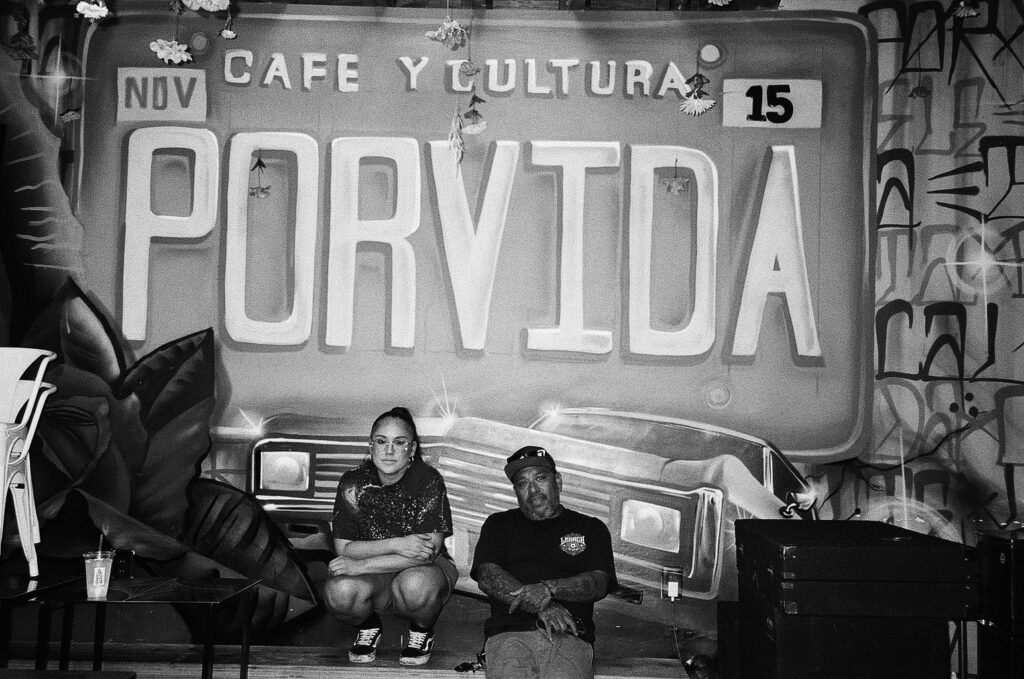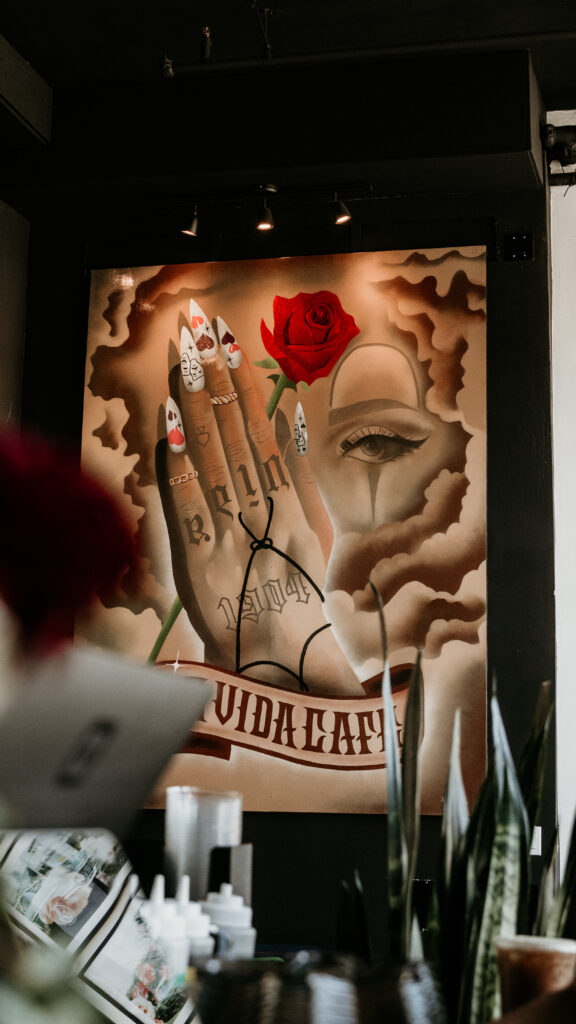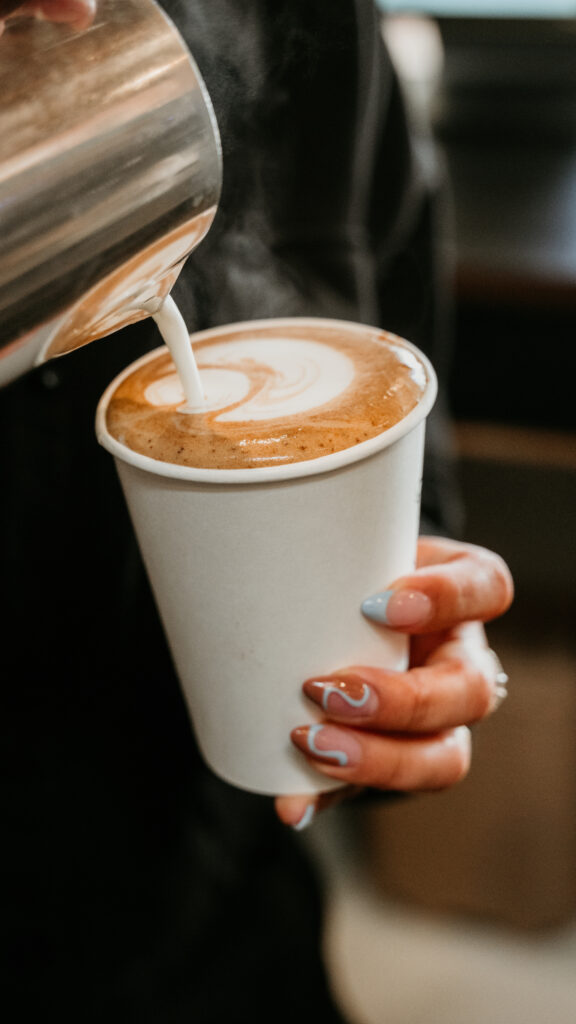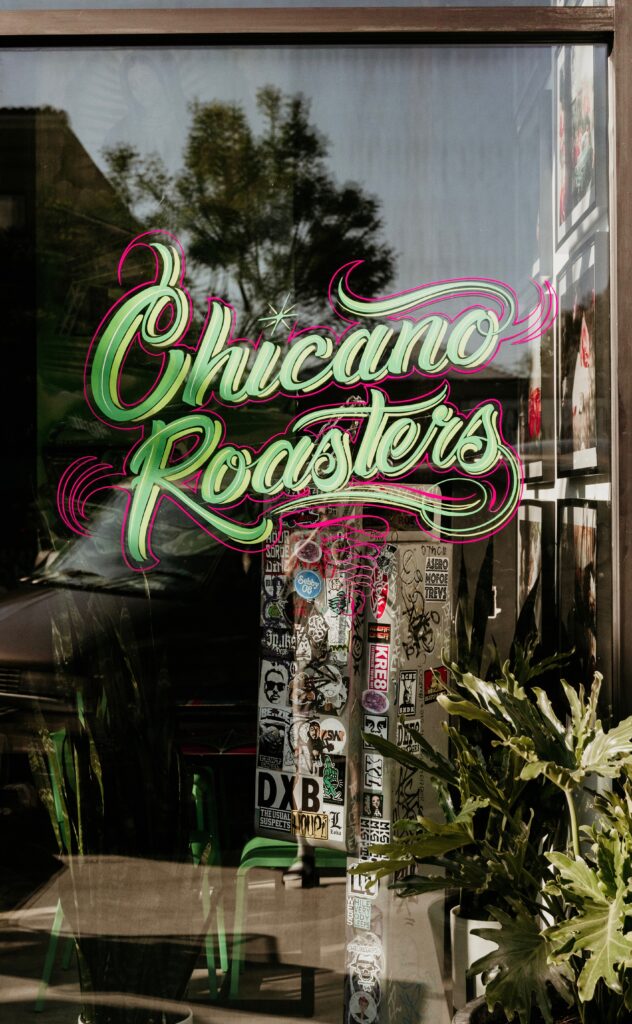
MILO: Barrio Logan is very special to the Chicano community because the preservation of our culture exists strong here. I think the difference is that people are still trying to work with the neighborhood – keeping it brown, keeping it small business, trying to do as much as they can for their neighbors. We still have a tight hold on the community and should be very thankful that going into 2025, we stand where we do. At any given time things could change, fast.
Gentrification – outsiders moving in to take over, property values going up – is a real concern because it’s washed out neighboring communities and has been happening for so many years. Sometimes people can’t afford to be somewhere anymore. Landlords are making decisions based on property value, and not weighing out the community value a space can provide.

CARO: We started on November 20th, 2015. At the time we were both running Salud Tacos & Beer, which used to be here in Barrio Logan owned by Ernie Becerra. It was thriving and Milo was very much the creative director, I would say. He helped facilitate a lot of the art & aesthetics of the establishment. I worked on everything administrative. There was a point when we saw our ability to make someone else’s business thrive for what it was and thought about doing it for ourselves. We came down the block and felt pulled to this exact location, inquired, and started leasing it before we even had a full concept of what we would do.
Milo had a consistent customer at Salud come in one day talking about a coffee cart he purchased for his wife; she had a vision of wanting to open a coffee shop but recently had a change of heart. Long story short we took it in & went for it. We received support from a few other community members, one of them being Bucky Montero. She was a major asset to our beginning because she was a coffee drinker, and we weren’t <haha>. We had to learn all of the above to figure out what coffee was about.
Do you drink coffee now?
Oh, yeah, absolutely. <haha> That’s funny. I don’t necessarily need to have it every day, but I do have my moments where I’ll come in to have my first cup and feel so much better. I remind myself of that feeling when I’m working. Coffee is definitely a mood booster, it changes something in you, for the better.

MILO: We used to do a lot of events, one of the first being Barrio Logan flea market. We had makers and crafters from LA, El Centro, and throughout San Diego show out, a minimum of 50 vendors every second Saturday of the month. Consistently it was like that for 2 to 3 years, to the point where more businesses began to open on Logan Avenue. People started recognizing every second Saturday as an art walk through the neighborhood.
Sometimes our pride of being Chicano – Mexican, Latino, whatever you identify with – gets in the way of seeing what we have. The reality is that property owners here can have a change of heart at any time and stop giving us as many opportunities. So I think right now is a good time to ground ourselves.
I hope that we can still be part of this community moving forward, but the future is untold. We don’t know what’s gonna happen when the owner of this building wants to build 4 stories high and put a retail spot under here, probably double or triple our rent. We have a lot to display, but we also have to walk very cordially over the next few years. I predict a big shift coming up. It’s a hard conversation, but I think it’s a conversation that needs to be had now.
We have so much intention not only for our business but for the community, because we love it here – the people, the history of Chicano Park, there’s so much good. The thought of not being able to be around is scary, but I think everybody goes through it. San Francisco went through it pretty bad with all the techs out there, especially in that whole little section on Haight Street… That’s why it’s key to put these topics front & center because we will be going through that. And how will we adapt? How will we move? How will we stay relevant? How do we, not only as a business but as Chicanos, keep the culture going? Something like a magazine can have so much meaning to individuals and impact on communities; when we first saw your issues, we hadn’t even opened it yet and identified with it. Keeping culture alive – I think what you’re doing right now is a great start because you’re pushing stories that sometimes people don’t like to talk about.
Por Vida has always been about community because it was built up by it. But also, being a Chicano/Mexican-owned business, I’ll say it – no one was doing what we were doing when we started. We built our menu using the tastes we were familiar with growing up as kids: canela, horchata, masapan… We infused these flavor profiles in our coffee and now these drinks are everywhere. I literally Googled horchata latte back when we opened this and nothing came up. You do that now… I mean, Starbucks, all over YouTube, everyone’s on this wave. No one was doing it before us.

CARO: Chicanos didn’t really identify with coffee culture because we were never exposed to it. When I used to go to coffee shops, if I ever did, I would look at the menu and have so many questions… What’s a cortado? A macchiato..? The first time I went to a specialty coffee shop I ordered an espresso. I had no clue, and the barista knew I didn’t know <haha>.
We take a lot of pride in having learned everything we’ve needed to over the years, but a lot of the important things, someone else taught us. We’ve had the help, so we also like to pay it forward. It feels really good to teach customers about the coffee game, or to see someone else thrive in opening up their own shop, and know they’re doing it for other people as well.
MILO: I like to think our business identifies with Chicano art and culture on a broader scale. We’ve been fortunate enough to travel to these countries where our culture is thriving, have had people from Japan come to visit us personally. To experience that firsthand, seeing our culture put on a pedestal, makes us feel seen and relevant.
Things changed dramatically after COVID, for everybody. This street had so much momentum and suddenly all these small businesses couldn’t sustain themselves anymore, things felt like a ghost town. We used to have around 12 to 15 employees and when we came back, it was literally just me and her.
The pandemic was like a reset, man. I lost my dad to COVID. But it also taught us so much, both in our relationship and our business.
I think the beauty of San Diego is that it truly is a scene that’s united. Pre-COVID, the community used to do latte art throw-downs. A couple hundred baristas would come out to compete, super friendly competition, over who could throw the best latte art. Judges would come from different coffee shops, plus whoever was hosting. Then you would have a DJ, a food vendor, and then, of course, coffee. The winner would get prizes and cash at the end. But in those events, you could really see the unity of different baristas & shop owners coming and supporting.
Around 2007, 2008, I became interested in the art scene through photography. A friend of mine had a gallery, I started hanging around him, and the next thing you know, I had about 3 successful galleries myself. One of my good friends I grew up with was throwing an event at one of our galleries, and Caro came to help. That’s how we met.
CARO: Milo was an asset when it came to Salud. I say that because he brought a majority, if not all of, the artists that installed pieces inside there. Those bonds to those artists came from his background owning galleries. So everything sort of lined up for him to be able to curate Salud, which then came over to Por Vida. I would say we’ve gone through around 4 different phases. I give him all the credit and all the flowers.
MILO: This month will be 13 years of me and Caro being together. I think our work/business partnership serves us in our personal relationship because we’re so intertwined; there’s an extra level of understanding and reassurance at home because there’s a deeper understanding of motivations and frustrations in the workplace. I can get a little obsessive at times, with art for the space or finances… Caro knows how to bring me down.
CARO: Naturally, there are seasons where we don’t see eye to eye. But we’ve always pulled back to each other through re-inspiring one another, encouraging the reinvention of ourselves. I mean, both of us managed to earn separate degrees on the side while running Por Vida. It’s nice to have a partner who can adapt and not stay stuck in a phase; sometimes people get left behind while your partner’s evolving, growing, maturing, and exploring new things. In this case, God truly united us because he knew we would be the best fit for one another. There is a bigger plan here. And it’s been succeeding in serving each other, and the people who surround us every day.